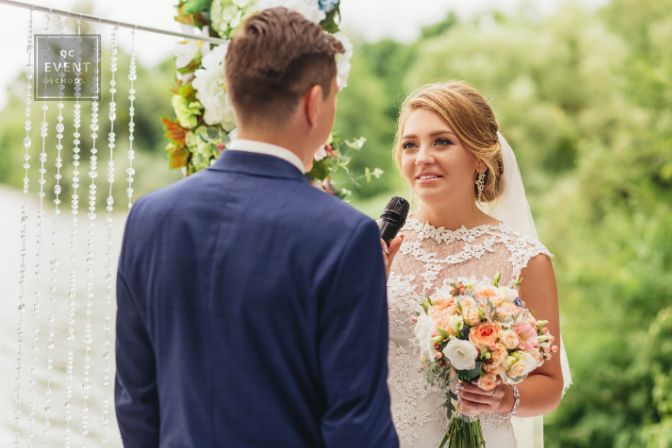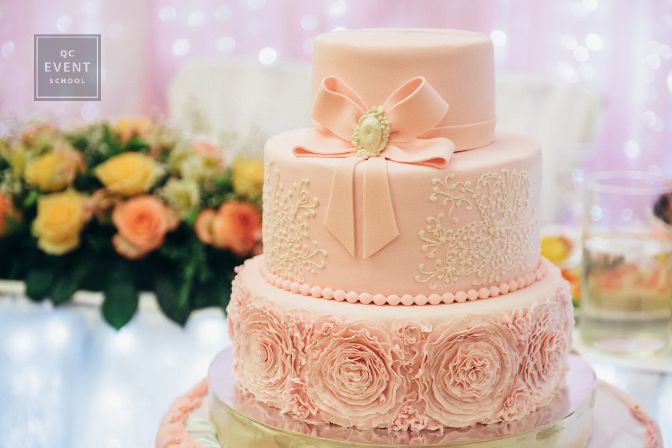
Event Planning Tips, From the Experts, General Tips, Planning Tips, Wedding Planning Tips, Your Event Career
How to Become a Wedding Planner: Contingency Planning
Want to know how to become a wedding planner? Mwai Yeboah reveals how to prepare for the unexpected and problem-solve like a pro! With over 15 years of industry experience, Mwai is the proud owner of Love, From Mwai and one of QC Event School’s leading tutors. In addition to the countless awards she has received over the years, Mwai has also written and published her very own book about wedding planning.
How to Become a Wedding Planner: The Importance of Contingency Planning
As you’re learning how to become a wedding planner, you’ve probably thought about contingency planning once or twice. Contingency planning is the need to prepare for the unexpected. After all, your job as a wedding planner encompasses everything (and I mean everything) it takes to ensure a celebration goes off without a hitch. If there’s a spill on a suit or a last-minute change of venue, it’ll be up to you to save the day by responding accordingly!
As someone who’s been a luxury wedding planner for twenty years, I can tell you this: there is no limit to the “crazy” you will see throughout your career. So, what surprises and setbacks have I overcome? More importantly, how did I pull off an impeccable wedding at the end – despite the unexpected hiccups?
Read on, because I’m going to spill all of the tea and tips… 😉
How to Become a Wedding Planner: 4 Common Emergencies
1 – Unwelcomed Weather
I’m starting with the most obvious (and anticipated) wedding-day setback: bad weather. Sometimes, there’ll be windy days that threaten to upend a tented wedding. Other times, stormy skies might encroach on what should have been a sunny ceremony. Weather can be unpredictable. As a result, it sometimes has a way of surprising you.
Regardless of what the forecast says, you absolutely have to have a weather contingency plan for every single event you plan – especially the outdoor ones. Here are some of my favorite stories and tips….
Tip #1: Keep tools on-hand that can help you deal with the effects of unwelcomed weather.
One time, it rained a lot more than anyone had anticipated. Because of this, our ceremony venue completely flooded just a few short days before the nuptials were set to take place! Luckily, we had a pump on hand. After two days of pumping, we were able to set up the ceremony as beautifully as ever. Phew!
Tip #2: Always (and I mean always) have a backup venue.
Every single event I plan has a backup venue space or tent ready to go. Moreover, these backup venues are only one quick phone call away. I make sure to choose a space that’s just as exciting and right for the aesthetic as the original venue. I do this because I never want a client to feel as though the space they’re celebrating their union in is a “last-resort”.
For one particular wedding, we had a beautiful al-fresco brunch planned. Unfortunately, rain was forecast and we had to quickly shift things to the backup venue. Luckily, though, the indoor venue ended up being a perfect fit for the Moroccan theme. Everyone was overjoyed to step inside and see the experience we’d created!
Tip #3: Don’t underestimate the effects of heat.
As you learn how to become a wedding planner, you’ll understand the value of preparing for rain on a wedding day. But hot weather can be just as devastating and destructive as wet weather! I once hosted an outdoor wedding in Rwanda and completely underestimated just how bad the heat would be. The fresh flowers literally began dying the MOMENT the stunning floral structure was complete.
Luckily, we’d planned ahead. When we’d composed the original design, we’d taken into account the fact that we might not have enough flowers on-hand. (Locally, there weren’t a ton of options.) So, we ended up bringing lots of backup greenery with us. This backup greenery ended up working as a perfect stand-in for the shriveled flowers. Moreover, it fit in beautifully with the garden location. Because of this experience, we now have a cold track on any one of our destination weddings that’s in a hot location.
2 – Wardrobe Malfunctions
There are a lot of things that can go wrong when it comes to clothing. Broken heels, red-wine spills, fabric tearing, and zippers breaking are among the most common. As you prepare for your client’s big day, I encourage you to think through EVERY scenario that could possibly go wrong with the wedding wardrobe. This way, you have a plan to solve it!
Wardrobe surprises are one of the most common “uh-oh” moments in weddings. This is exactly why my business always has a tailor on-site to fix any wardrobe issues. While paying a tailor to be on standby might seem expensive and excessive, being prepared is a much better option than having nothing but a shoulder shrug to offer your bride when her skirt rips.
How to Become a Wedding Planner Pro Tip: Keep your emergency kit properly stocked!
In addition to having a professional on-site, make sure your wedding-day emergency kit is stocked with:
- Veil weights (for windy days)
- Super glue
- Sewing kit
- Stain remover stick
- Hydrogen peroxide, baking soda, and a small bottle of club soda (all of which can work wonders on stains)
- Safety pins
- Double-sided tape
- Wardrobe tape
- Lint roller
- Static guard
- Boutonniere pins
- Blister pads and Band-Aids
- Anti-slip pads for inside of heels
3 – Forgotten Vows
During one of the weddings I planned, the Maid of Honor forgot to bring the bride’s vows with her to the ceremony! I was actually my clients’ Officiant and in the middle of marrying the couple when the MOH realized she’d forgotten the vows. Luckily, I always carry printed copies of all my couples’ vows with me for this exact reason! So, I simply pulled them from my pocket and handed them over to the bride. From vows to speeches, I recommend having a hard copy with you of all prepared remarks happening at the wedding – just in case.
4 – Vendor Mishaps
If you want to know how to become a wedding planner, one key thing to learn early on is that all weddings are a TEAM effort. You can’t make your client’s special day a reality without the help of vendors.
However, sometimes the unexpected will happen on the big day. Vendors may forget equipment, show up late, or outright cancel at the last minute. While you may not be contractually responsible for a vendor’s mistake, you WILL be held responsible in the eyes of your client. If a florist forgets an arrangement, it’s your problem. When a DJ doesn’t show up, it’s your problem. If a rental company brings the wrong color linens, it’s your problem. If a photographer is late and misses the ceremony… You get the point.
As a wedding planner, your job is to ensure things run smoothly. So, it’ll be up to you to mitigate the emergency to the best of your ability!
Tips for What to Do
This is where clear communication, backup plans, and a team-oriented approach will serve you well. Never treat the vendors as if their job is separate from your own. After all, a large part of your job is to make sure that the vendors are doing theirs. This means ensuring that:
- Everyone is working from the same timeline;
- You have everyone’s mobile phone number stored, so you can contact them easily on the day-of the wedding;
- You understand who you’ll be working with, should they be sick or have an emergency on the day-of;
- Everyone is aware what the contingency plans are, etc.
There was one particular wedding I planned where the baker left the cake overnight in the hotel kitchen’s cold room. The following day, they returned to find it had been knocked over. (Can you imagine?!) For our destination weddings, we always tell our bakers to have extra tiers, extra frosting, and extra decor readily available for instances just like this. In this situation, it took a while to rebuild and redecorate the top-tier of the cake. But because the baker had those extra tiers and supplies on-hand, she didn’t have to bake a cake from scratch. As a result, when the reception time came around, no one was the wiser!
How to Become a Wedding Planner: My Final Thoughts
Whether we’re talking about bad weather, a broken-down car, a family misunderstanding, or a vendor cancellation – as a wedding planner, you have to think of a contingency plan for every aspect of the event you’re hosting! After all, at its core, learning how to become a wedding planner is really just learning how to creatively problem-solve, adjust, and adapt on the fly. This way, you can take whatever the wind throws your way with poise and professionalism. If you can do that, you’ll be well on your way to a fruitful career in this incredible industry!
Xoxo,
-Mwai



